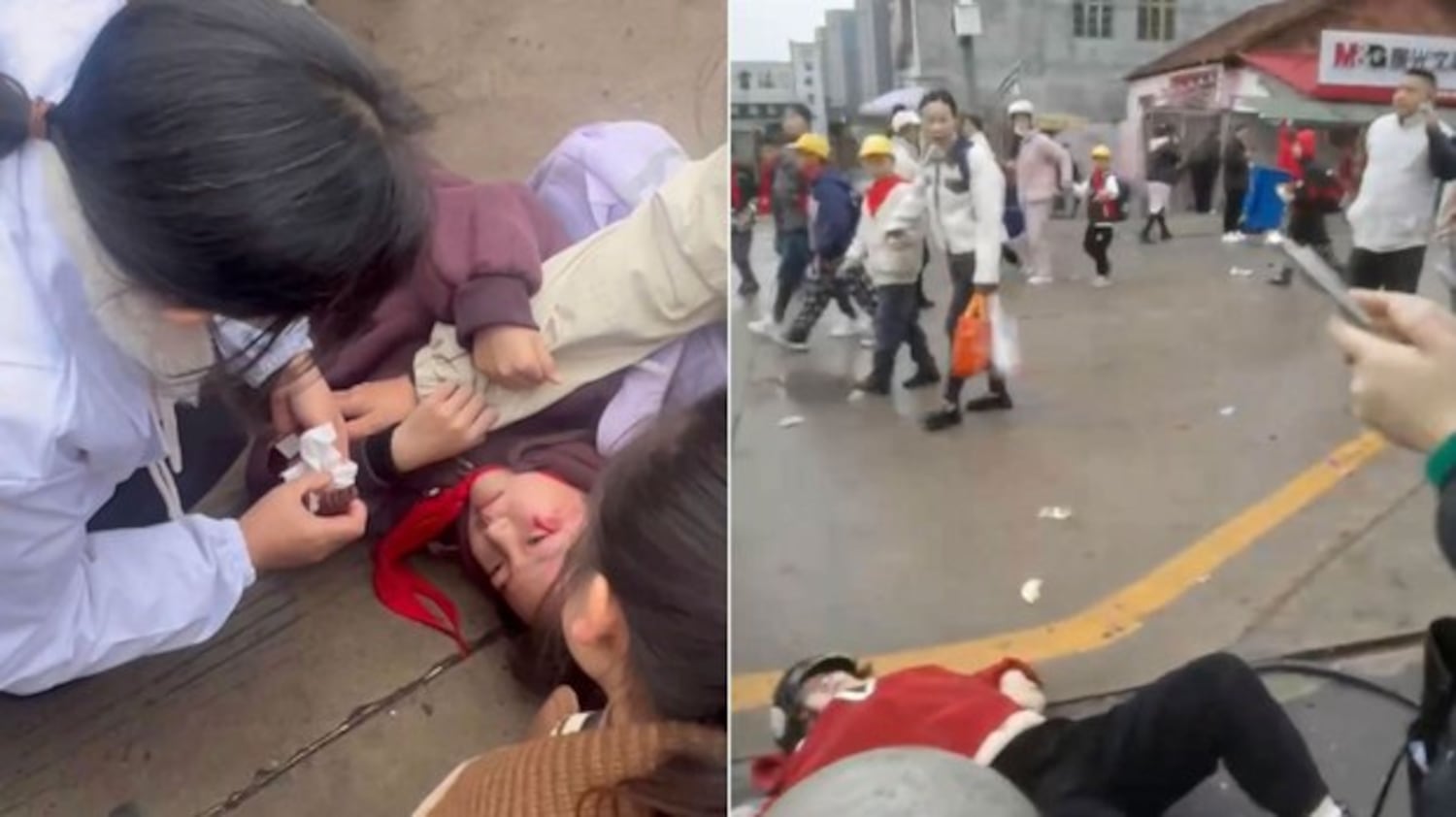China is reeling in the wake of a number of attacks on members of the public in recent weeks, including a fatal car attack at a stadium in the southern port city of Zhuhai this month that left 35 people dead and dozens more injured.
Since then, further violence has been making the headlines, including stabbings on two college campuses at the weekend and a car attack on students at a primary school in Hunan province.
Several schoolchildren were injured on Tuesday after being struck by a car as they arrived to start their day at the Yong’an Primary School in Hunan’s Changde city, state media reported.
A video clip uploaded to social media showed people lying on the ground in the immediate aftermath of the attack, as media reports said a man had been arrested in connection with the incident.

The attack came after police arrested a 21-year-old man in connection with a stabbing attack at the Wuxi Yixing Arts and Crafts Vocational and Technical College on Nov. 16 that left eight people dead and 17 injured, while a stabbing incident was also reported at the Guangdong Institute of Technology on Nov. 17, according to social media posts with photos from the scene.
Analysts who spoke to RFA Mandarin in recent interviews pointed to a “pressure-cooker” effect on ordinary people of a flagging economy and growing social inequality, prompting attacks that are widely seen as a form of “revenge” on society.
An online commentator from the eastern province of Shandong who gave only the surname Lu for fear of reprisals said people in China are struggling, and the cracks are beginning to show.
“Some people are starting to feel that life is meaningless,” Lu said. “This is a very unjust society, and people are starting to hate the system, leading to a string of tragedies.”
“The domestic economy is doing badly, and it’s getting harder and harder to get by, what with growing pressure from unemployment and the cost of housing,” Lu said, adding that ruling Chinese Communist Party policies don’t appear to be alleviating the burden on ordinary people.
“The party is creating that pressure rather than solving the problem and relieving it,” he said.
‘Pressure-cooker with no release valve’
Economic pressures are leading to strained family relationships and break-ups, while a culture of extreme overwork for those who do have a job often leads to mental health problems and sudden deaths, commentators said.
The intersection of economic pressures and institutional problems is gradually tearing apart the fabric of Chinese society, according to writer Ye Fu.
“These are troubled times,” Ye said. “Livelihoods are under pressure, and the middle and lower classes are getting desperate, so there’s bound to be a rise in violence.”
“The whole of society is like a pressure-cooker, which will eventually explode if it is suppressed with no release valve,” he said.
RELATED STORIES
China car killings could spark new round of security measures
China to probe marital, neighbor disputes in wake of car attack
China bans students from mass cycle rides at night
A commentator from the central province of Hunan who gave only the surname Yu for fear of reprisals said that violent attacks are likely to continue until the government takes action to alleviate the pressures on ordinary people.
“If the government refuses to address such social conflicts at their source, and from the perspective of social justice, and keeps repressing them, then people will continue to take such retaliatory action against society as a whole,” Yu said.
“They can’t get fair treatment … the authorities won’t accept petitions, so they retaliate in some other way against society,” he said, adding that the suppression is largely the result of China’s nationwide system of “stability maintenance,” which aims to suppress and silence government critics before they can take action, including through legal channels.
A resident of Shandong who gave only the surname Zhang for fear of reprisals said such attacks are also likely to spawn copycat incidents in future.
“Some people feel stressed or angry, but have nowhere to express that,” Zhang said. “So when they see that someone drove a car into some people, they imitate those actions.”
“The main issue is that it’s getting too hard to survive, and a lot of people switch into an alternative kind of survival mode,” he said.
Prioritizing the economy
Scholar Wang Qun blamed the government’s insistence on the economy as the main solution to inequality.
“Prioritizing economic growth over social equity leads to the neglect of individual happiness, and the uneven distribution of public resources like education, medical care and housing,” Wang said. “It means that it’s very hard for ordinary people to enjoy equal opportunities.”
And the economic pressures are taking place in a political climate of extreme censorship and restriction, he said.
“Critical voices on social issues are often suppressed, and the fact that many of their channels of expression have been closed off has exacerbated young people’s sense of powerlessness,” Wang said.
Public health scholar Lu Jun agreed with the “pressure-cooker” metaphor.
“In a normal society, people have some kind of outlet for their emotions, and some kind of chance at justice, or at the very least a channel through which to speak out, via the judicial system,” Lu said.
“But it’s becoming increasingly unlikely that anyone will get justice in China through legal means.”
Translated by Luisetta Mudie. Edited by Joshua Lipes.
This content originally appeared on Radio Free Asia and was authored by Qian Lang for RFA Mandarin.
This post was originally published on Radio Free.